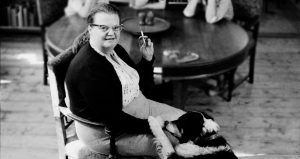 I read this book mostly in the beautiful vacation house we rented in Ogunquit this summer. We spent there the whole 4th of July week and it was such a gift. Mornings were beyond beautiful in the back sunroom or on outside on the patio with a book and a cold coffee. Although I had started the book at home several weeks before, I was not able to make any progres through it, but on vacation, on the porch, there was no stopping me.
I read this book mostly in the beautiful vacation house we rented in Ogunquit this summer. We spent there the whole 4th of July week and it was such a gift. Mornings were beyond beautiful in the back sunroom or on outside on the patio with a book and a cold coffee. Although I had started the book at home several weeks before, I was not able to make any progres through it, but on vacation, on the porch, there was no stopping me.
I hadn’t known about Margaret Sanger before reading this book, because I am illiterate like that in the women’s movement in US. She is such an interesting character: a dedicated woman who believed so strongly in the cause of women controlling their own fertility that she worked for it tirelessly until the very end of her life in spite of all the difficulties of living in a time when birth control was illegal and considered murderous to the nation, when women were urged to procreate as the best thing they could do for society. Those were very dark times when even doctors were afraid to teach women about contraceptive methods and only the upper classes had access to such information as the use of spermicides. Women had as choices only abstinence or more pregnancies than their bodies could handle and more children than they could actually feed.
She was very vocal against the Catholic church and its priests who, never actually knowing a real woman, spoke with authority about what women should do with their lives and bodies.
She was controversial for being a lifelong promoter of eugenics and her opening birth control clinics in African-American communities. According to the author of this book, however, Margaret Sanger, although with many faults, was in no way a racist, and it was very important to her that all women, regardless of race and social status, have access to contraception.
I felt inspired by her determination and dedication. The story of her life also raised many questions and doubts. The book does not portray her in the best of lights, on the contrary, it shows many of her failures, including that at parenting. She left her children in boarding schools to be able to travel and spread her message, because she felt she couldn’t fully be a mother and an activist. One of her children actually died due to difficult conditions in the boarding school, but she didn’t seem to have ever stop to blame herself or question her priorities. After the biography of Agatha Christie, I seem to see a common theme here: women throughout history who ever achieved something, did so at the expense of their role as mothers. In one way or another, they sacrificed motherhood for their work. I wonder if it is indeed true or these are just random examples. I hope some of them found the middle ground. Emily Dickinson never had children. Neither did Virginia Woolf. Or the Bronte sisters. Or Jane Austen. I am a believer in the middle ground, but does it truly exist? Even today?



